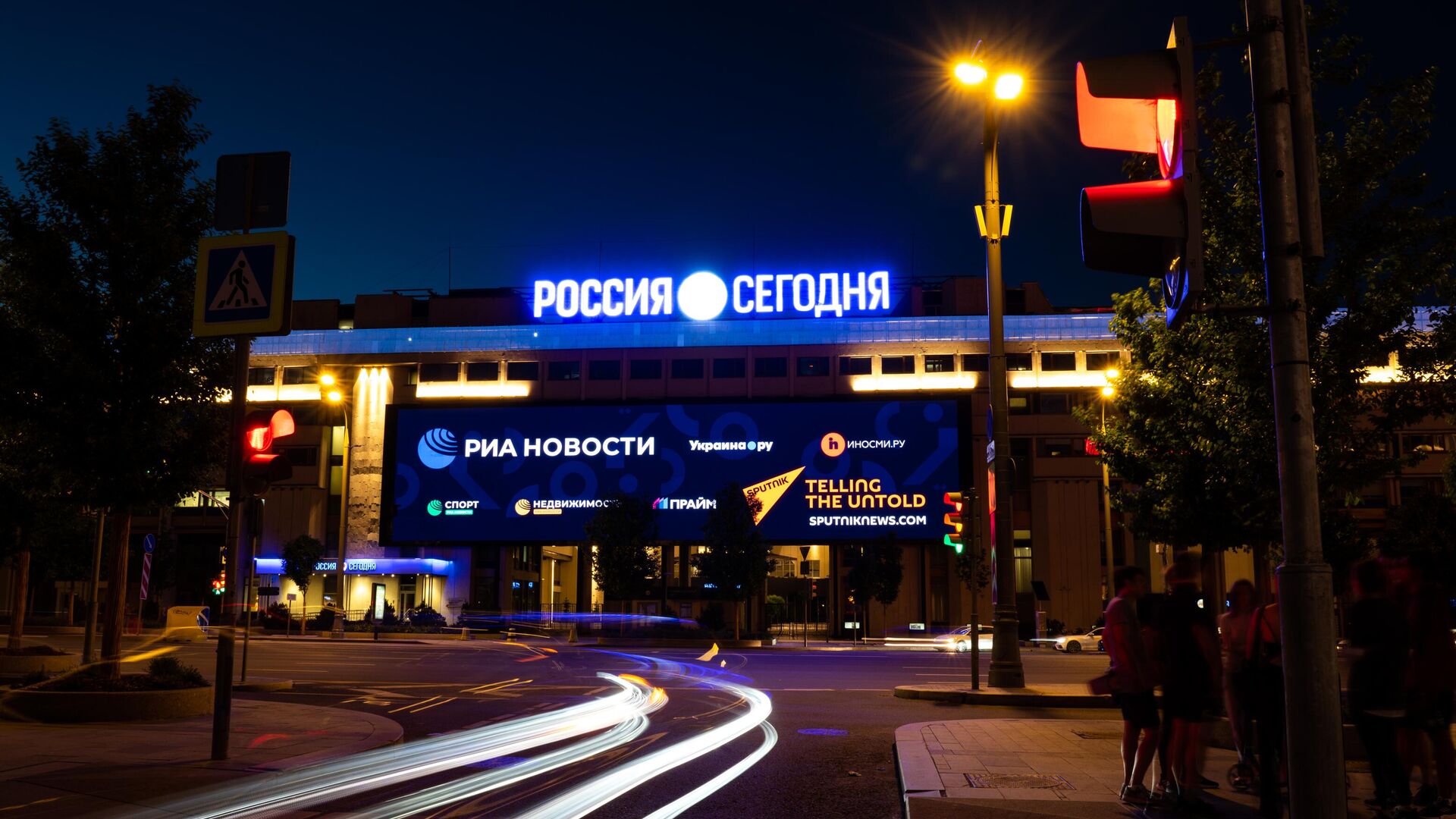https://en.sputniknews.africa/20240503/narrowing-media-objectivity-space-journo-on-europes-ban-of-russian-media-on-press-freedom-day-1066355364.html
'Narrowing Media Objectivity Space': Journo on Europe's Ban of Russian Media on Press Freedom Day
'Narrowing Media Objectivity Space': Journo on Europe's Ban of Russian Media on Press Freedom Day
Sputnik Africa
Every year on May 3, the World Press Freedom Day is celebrated across the globe, which aims to highlight the significant role that the press, journalism, and... 03.05.2024, Sputnik Africa
2024-05-03T18:41+0200
2024-05-03T18:41+0200
2024-05-03T18:41+0200
opinion
africa insight
europe
russia
west
european union (eu)
media
journalist
holidays
sputnik
https://cdn1.img.sputniknews.africa/img/07e7/0c/09/1064038046_0:0:3113:1751_1920x0_80_0_0_6a441b81ba82872c104dfde374d07eae.jpg
By blocking Sputnik and other Russian media after Moscow launched a special military operation in Ukraine, the European Union has shrunk the space for media objectivity, Dr Is'haq Modibbo Kawu, a renowned Nigerian broadcaster, political scientist, and former Director General of Nigeria's National Broadcasting Commission, told Sputnik Africa on the World Press Freedom Day.The EU has banned the Russian TV channel RT and the Sputnik agency from broadcasting in the bloc from March 2, 2022, accusing them of "playing an important role in promoting and supporting military aggression against Ukraine, as well as in destabilizing its neighboring countries."The Nigerian broadcaster explained that the EU's aim was to ensure that the Russian perspective on what was happening and the context of the special military operation was not known to agencies in Europe and America.Kawu pointed out that the West's restriction of the media shows that it is afraid that new forces have emerged to tell the world that there are different ways to develop the world.The journalist added that the world is becoming increasingly multipolar, with people "no longer enslaved to just the western platform of news."Speaking about the purpose of the media in Africa, the journalist said that the press should help the continent to realize where it is and build new mutually beneficial relationships amid geopolitical tensions.Emphasizing that Africa's relations with the West have been unequal, the expert said that Russia, China, India, Iran and Brazil can offer the continent win-win relationships.In 2024, World Press Freedom Day will focus on the importance of journalism and freedom of expression in the context of the current global environmental crisis.Speaking on the issue, the journalist said that most of the crises Africa faces today are directly related to the ecological crisis.Speaking of other challenges faced by journalists, he noted "tremendous pressure," especially in relation to military actions. He cited the conflict in Gaza, where more than 140 journalists have been killed.
https://en.sputniknews.africa/20240312/online-free-expression-day-banning-other-countries-media-underscores-wests-hypocrisy-1065504624.html
europe
russia
west
ukraine
Sputnik Africa
feedback@sputniknews.com
+74956456601
MIA „Rossiya Segodnya“
2024
Maxim Grishenkin
https://cdn1.img.sputniknews.africa/img/07e7/0a/17/1063018107_0:0:1104:1103_100x100_80_0_0_03090c85a11f5d2e8a19cf1d989443c9.jpg
Maxim Grishenkin
https://cdn1.img.sputniknews.africa/img/07e7/0a/17/1063018107_0:0:1104:1103_100x100_80_0_0_03090c85a11f5d2e8a19cf1d989443c9.jpg
News
en_EN
Sputnik Africa
feedback@sputniknews.com
+74956456601
MIA „Rossiya Segodnya“
Sputnik Africa
feedback@sputniknews.com
+74956456601
MIA „Rossiya Segodnya“
Maxim Grishenkin
https://cdn1.img.sputniknews.africa/img/07e7/0a/17/1063018107_0:0:1104:1103_100x100_80_0_0_03090c85a11f5d2e8a19cf1d989443c9.jpg
africa insight, europe, russia, west, european union (eu), media, journalist, holidays, sputnik, ukraine
africa insight, europe, russia, west, european union (eu), media, journalist, holidays, sputnik, ukraine
'Narrowing Media Objectivity Space': Journo on Europe's Ban of Russian Media on Press Freedom Day
Every year on May 3, the World Press Freedom Day is celebrated across the globe, which aims to highlight the significant role that the press, journalism, and access to and dissemination of information play in ensuring a sustainable future.
By blocking Sputnik and other Russian media after Moscow launched a special military operation in Ukraine, the European Union has shrunk the space for media objectivity, Dr Is'haq Modibbo Kawu, a renowned Nigerian broadcaster, political scientist, and former Director General of Nigeria's National Broadcasting Commission, told Sputnik Africa on the World Press Freedom Day.
The EU has banned the Russian TV channel RT and the Sputnik agency from broadcasting in the bloc from March 2, 2022, accusing them of "playing an important role in promoting and supporting military aggression against Ukraine, as well as in destabilizing its neighboring countries."
The Nigerian broadcaster explained that the EU's aim was to ensure that the Russian perspective on what was happening and the context of the special military operation
was not known to agencies in Europe and America.
"But that narrows the space of objectivity in terms of media. [...] The moment you restrict certain outlets, you make it very difficult for humanity to actually get the correct sense for what is happening to them, to the world we live in. I think it's also part of the fact that the so-called 'rules based order' is beginning to dissemble, and they're very worried about the fact that people are looking for new ways of understanding the world they are living," the broadcaster said.
Kawu pointed out that the West's restriction of the media shows that it is afraid that new forces have emerged to tell the world that there are different ways to develop the world.
"People want different perspectives, people want to understand that the world we're living in cannot be spoken about just the few countries. The world order from 1945, after the Second World War, is no longer the order of 2024," he opined.
The journalist added that the world is becoming increasingly multipolar, with people "no longer enslaved to just the western platform of news."
"We have practiced journalism enough to know also that there is no one way to be a human, therefore, there is no one way of looking at the world. People want a media bouquet that allows them to understand this new reality, not just a narrow Western perspective that was anyway cooked out of an experience that is very bitter for us," Kawu remarked, adding that the experience is centered around slavery, colonialism and neo-colonialism.
Speaking about the purpose of the media in Africa, the journalist said that the press should help the continent to realize where it is and build new mutually beneficial relationships amid geopolitical tensions.
Emphasizing that Africa's relations with the West
have been unequal, the expert said that Russia, China, India, Iran and Brazil can offer the continent win-win relationships.
"These are countries that have gone through certain experiences that, in a lot of ways, are also relevant to our own experiences and so when we take those relationships and then use them as platforms for our own development, I think the world will be a better place. A world of a unipolar, so-called rules based order, which is actually a hegemonic imperialistic order, is not the best way to grow in the 21st century," Kawu stressed.
In 2024, World Press Freedom Day
will focus on the importance of journalism and freedom of expression in the context of the current global environmental crisis.
Speaking on the issue, the journalist said that most of the crises Africa faces today are directly related to the ecological crisis.
"To practice journalism in the context of the ecological crisis means that you have to be aware of the nature of the conflict you're dealing with and then how to negotiate between the different parties, because it's often not easy to practice journalism in this context," Kawu added.
Speaking of other challenges faced by journalists, he noted "tremendous pressure," especially in relation to military actions. He cited the conflict in Gaza, where more than 140 journalists have been killed.
"Journalism is almost an endangered profession today, in terms of the relationship with warfare," the broadcaster concluded.



